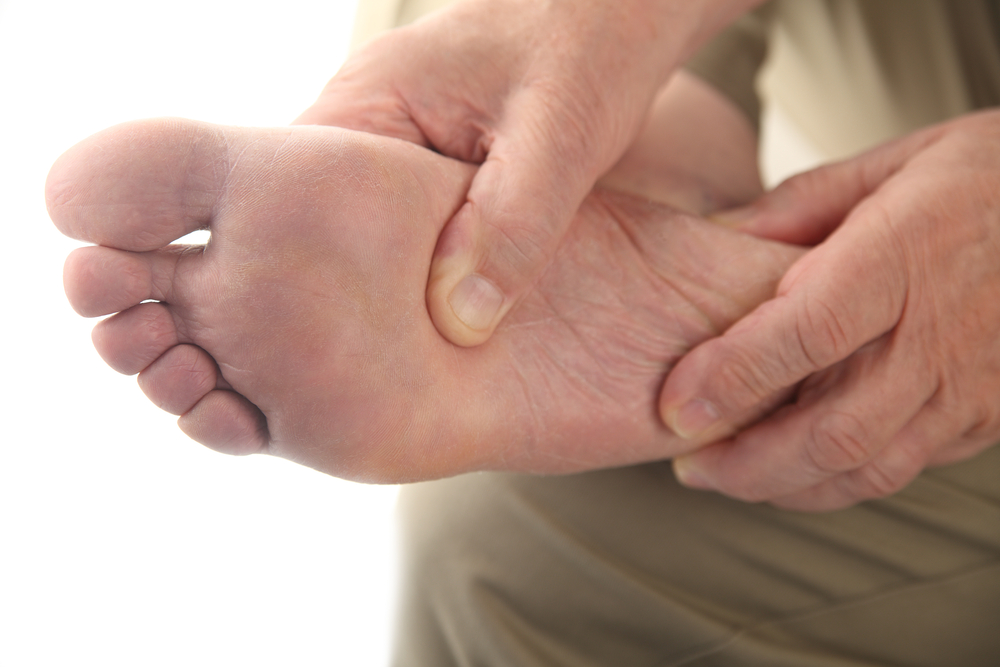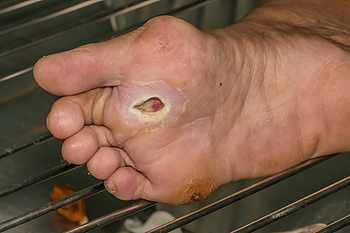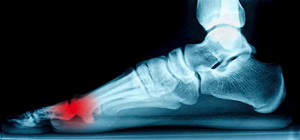Older Patients May Have Difficulty With Trimming Their Toenails
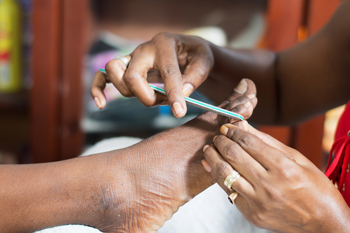 It can be difficult for older people to properly care for their feet. This can be a result of having trouble bending down to trim the toenails, and they may not notice if there are existing cuts or bruises on the feet. Wearing shoes that fit properly is crucial in possibly preventing painful foot conditions from developing. These can include corns, bunions, and calluses. Cracked heels is a common ailment among seniors, and mild relief can be felt when a good moisturizer is frequently applied. When the toes are not trimmed on a routine basis, or when they are trimmed improperly, ingrown toenails can develop, and can become infected without prompt treatment. Many elderly people are under the care of a podiatrist who can guide them with properly taking care of their feet.
It can be difficult for older people to properly care for their feet. This can be a result of having trouble bending down to trim the toenails, and they may not notice if there are existing cuts or bruises on the feet. Wearing shoes that fit properly is crucial in possibly preventing painful foot conditions from developing. These can include corns, bunions, and calluses. Cracked heels is a common ailment among seniors, and mild relief can be felt when a good moisturizer is frequently applied. When the toes are not trimmed on a routine basis, or when they are trimmed improperly, ingrown toenails can develop, and can become infected without prompt treatment. Many elderly people are under the care of a podiatrist who can guide them with properly taking care of their feet.
Proper foot care is something many older adults forget to consider. If you have any concerns about your feet and ankles, contact one of our podiatrists from PA Foot & Ankle Associates. Our doctors can provide the care you need to keep you pain-free and on your feet.
The Elderly and Their Feet
As we age we start to notice many changes in our body, but the elder population may not notice them right away. Medical conditions may prevent the elderly to take notice of their foot health right away. Poor vision is a lead contributor to not taking action for the elderly.
Common Conditions
- Neuropathy – can reduce feeling in the feet and can hide many life-threatening medical conditions.
- Reduced flexibility – prevents the ability of proper toenail trimming, and foot cleaning. If left untreated, it may lead to further medical issues.
- Foot sores – amongst the older population can be serious before they are discovered. Some of the problematic conditions they may face are:
- Gouging toenails affecting nearby toe
- Shoes that don’t fit properly
- Pressure sores
- Loss of circulation in legs & feet
- Edema & swelling of feet and ankles
Susceptible Infections
Diabetes and poor circulation can cause general loss of sensitivity over the years, turning a simple cut into a serious issue.
If you have any questions please feel free to contact one of our offices located in Allentown, Easton, Northampton, and Chew Street in Allentown, PA . We offer the newest diagnostic and treatment technologies for all your foot and ankle needs.
How Does Plantar Hyperhidrosis Occur?
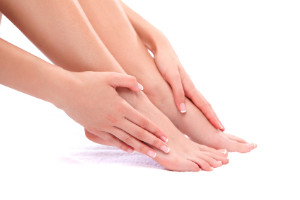 Hyperhidrosis is the medical term that is used to define excessive sweating. Some patients have feet that sweat for the majority of the day, and this is referred to as plantar hyperhidrosis. It may happen as a result of anxiety, hormonal changes, or living in a hot environment. This condition may cause embarrassment during the day as the feet begin to slide in certain types of shoes. Additionally, rashes may develop, and there may be an odor coming from the feet. It is beneficial to wear shoes that are made of breathable materials, and comfort may be found when foot powder is frequently sprinkled in the shoes. If you have symptoms of plantar hyperhidrosis, it is strongly suggested that you consult with a podiatrist who can help you to manage this condition.
Hyperhidrosis is the medical term that is used to define excessive sweating. Some patients have feet that sweat for the majority of the day, and this is referred to as plantar hyperhidrosis. It may happen as a result of anxiety, hormonal changes, or living in a hot environment. This condition may cause embarrassment during the day as the feet begin to slide in certain types of shoes. Additionally, rashes may develop, and there may be an odor coming from the feet. It is beneficial to wear shoes that are made of breathable materials, and comfort may be found when foot powder is frequently sprinkled in the shoes. If you have symptoms of plantar hyperhidrosis, it is strongly suggested that you consult with a podiatrist who can help you to manage this condition.
If you are suffering from hyperhidrosis contact one of our podiatrists of PA Foot & Ankle Associates. Our doctors can provide the care you need to attend to all of your foot and ankle needs.
Hyperhidrosis of the Feet
Hyperhidrosis is a rare disorder that can cause people to have excessive sweating of their feet. This can usually occur all on its own without rigorous activity involved. People who suffer from hyperhidrosis may also experience sweaty palms.
Although it is said that sweating is a healthy process meant to cool down the body temperature and to maintain a proper internal temperature, hyperhidrosis may prove to be a huge hindrance on a person’s everyday life.
Plantar hyperhidrosis is considered to be the main form of hyperhidrosis. Secondary hyperhidrosis can refer to sweating that occurs in areas other than the feet or hands and armpits. Often this may be a sign of it being related to another medical condition such as menopause, hyperthyroidism and even Parkinson’s disease.
In order to alleviate this condition, it is important to see your doctor so that they may prescribe the necessary medications so that you can begin to live a normal life again. If this is left untreated, it is said that it will persist throughout an individual’s life.
A last resort approach would be surgery, but it is best to speak with your doctor to find out what may be the best treatment for you.
If you have any questions please feel free to contact one of our offices located in Allentown, Easton, Northampton, and Chew Street in Allentown, PA . We offer the newest diagnostic and treatment technologies for all your foot and ankle needs.
Reminder: When Was the Last Time...?
Possible Reasons Why Foot Pain Occurs
Foot pain is considered to be one of the most common conditions that is endured by many people. It can develop for a variety of reasons, including genetic traits, wearing shoes that do not fit correctly, or if an injury has occurred. A bunion is a deformity that is found on the side of the big toe, and may cause the toe to shift toward the other toes. Plantar fasciitis and heel spurs are characterized by severe or mild heel pain, and moderate relief may be found when specific stretches are performed. If the nerve between the third and fourth toes becomes inflamed, it may be indicative of Morton’s neuroma. There are several types of foot pain and numerous reasons for their causes, if you would like additional information about treatment options, it is strongly advised that you consult with a podiatrist.
Foot Pain
Foot pain can be extremely painful and debilitating. If you have a foot pain, consult with one of our podiatrists from PA Foot & Ankle Associates. Our doctors will assess your condition and provide you with quality foot and ankle treatment.
Causes
Foot pain is a very broad condition that could be caused by one or more ailments. The most common include:
- Bunions
- Hammertoes
- Plantar Fasciitis
- Bone Spurs
- Corns
- Tarsal Tunnel Syndrome
- Ingrown Toenails
- Arthritis (such as Gout, Rheumatoid, and Osteoarthritis)
- Flat Feet
- Injury (from stress fractures, broken toe, foot, ankle, Achilles tendon ruptures, and sprains)
- And more
Diagnosis
To figure out the cause of foot pain, podiatrists utilize several different methods. This can range from simple visual inspections and sensation tests to X-rays and MRI scans. Prior medical history, family medical history, and any recent physical traumatic events will all be taken into consideration for a proper diagnosis.
Treatment
Treatment depends upon the cause of the foot pain. Whether it is resting, staying off the foot, or having surgery; podiatrists have a number of treatment options available for foot pain.
If you have any questions, please feel free to contact one of our offices located in Allentown, Easton, Northampton, and Chew Street in Allentown, PA . We offer the newest diagnostic and treatment technologies for all your foot care needs.
Is MLS Effective?
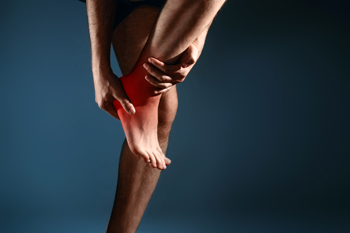 Patients who have chronic pain from specific foot conditions may be interested in learning about a treatment that is known as MLS laser therapy. It is defined as using wavelengths of light to possibly treat joint conditions, and injuries that have occurred to the tendons and ligaments. Additionally, it may help to reduce inflammation. After several treatments of approximately eight minutes each, swelling and pain may be diminished. Research has indicated the benefits of using MLS therapy may include faster healing of sprains, wounds, foot ulcers, and blood circulation may be improved. If you have chronic foot pain and are interested in learning more about MLS therapy, it is suggested that you consult with a podiatrist.
Patients who have chronic pain from specific foot conditions may be interested in learning about a treatment that is known as MLS laser therapy. It is defined as using wavelengths of light to possibly treat joint conditions, and injuries that have occurred to the tendons and ligaments. Additionally, it may help to reduce inflammation. After several treatments of approximately eight minutes each, swelling and pain may be diminished. Research has indicated the benefits of using MLS therapy may include faster healing of sprains, wounds, foot ulcers, and blood circulation may be improved. If you have chronic foot pain and are interested in learning more about MLS therapy, it is suggested that you consult with a podiatrist.
MLS Laser Therapy is a successful alternative for treating any pain you may be experiencing related to certain podiatric conditions. If you are interested in MLS Laser Therapy, consult with one of our podiatrists from PA Foot & Ankle Associates. Our doctors will assess your condition and provide you with quality foot and ankle treatment.
MLS Laser Therapy
Multiwave Locked System (MLS) Laser Therapy is a patented, FDA-cleared technology that helps relieve pain and inflammation from a number of podiatric conditions, including:
- Heel Pain
- Plantar Fasciitis
- Sports Injuries
- Wounds
- Achilles Tendonitis
- Arthritis
- Neuropathy
- Neuromas
MLS Laser Therapy is an ideal alternative to surgery and prescription medication, as it has no negative side effects and encourages accelerated healing. Among its many clinical benefits, MLS Laser Therapy also:
- Reduces swelling due to bruising or inflammation
- Blocks pain
- Reduces formation of scar tissue
- Improves nerve function
If you have any questions, please feel free to contact one of our offices located in Allentown, Easton, Northampton, and Chew Street in Allentown, PA . We offer the newest diagnostic and treatment technologies for all your foot care needs.
Cuts on the Feet May Be Common in Diabetic Patients
If you are afflicted with diabetes, maintaining proper foot care is important in possibly preventing foot ulcers and infections from occurring. Cuts, wounds, and bruises on the feet may heal slower in diabeteic patients, and need to be addressed promptly. The elevated blood sugar levels may initiate a loss of feeling in the feet, and this may cause difficulty in feeling new or existing cuts that have developed on the feet. It is beneficial to practice proper foot care everyday. This consists of gently washing and drying the feet, and checking to ensure there is minimal swelling and redness. If you have diabetes, it is strongly suggested that you are under the routine care of a podiatrist who can properly monitor your condition.
Diabetic foot care is important in preventing foot ailments such as ulcers. If you are suffering from diabetes or have any other concerns about your feet, contact one of our podiatrists from PA Foot & Ankle Associates. Our doctors can provide the care you need to keep you pain-free and on your feet.
Diabetic Foot Care
Diabetes affects millions of people every year. The condition can damage blood vessels in many parts of the body, especially the feet. Because of this, taking care of your feet is essential if you have diabetes, and having a podiatrist help monitor your foot health is highly recommended.
The Importance of Caring for Your Feet
- Routinely inspect your feet for bruises or sores.
- Wear socks that fit your feet comfortably.
- Wear comfortable shoes that provide adequate support.
Patients with diabetes should have their doctor monitor their blood levels, as blood sugar levels play such a huge role in diabetic care. Monitoring these levels on a regular basis is highly advised.
It is always best to inform your healthcare professional of any concerns you may have regarding your feet, especially for diabetic patients. Early treatment and routine foot examinations are keys to maintaining proper health, especially because severe complications can arise if proper treatment is not applied.
If you have any questions please feel free to contact one of our offices located in Allentown, Easton, Northampton, and Chew Street in Allentown, PA . We offer the newest diagnostic and treatment technologies for all your foot and ankle needs.
Why Live with Pain and Numbness in Your Feet?
What Are Fissures?
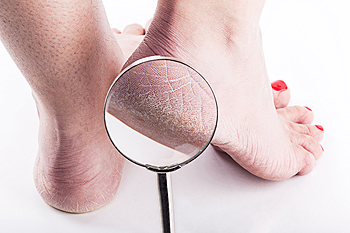 When the skin of the heels becomes dry, small cracks, which are known as fissures may begin to develop. This can occur as a result of standing for extended periods of time on a hard surface, or from wearing shoes that have an open back. Additionally, cracked heels may develop from medical conditions that can include eczema and psoriasis, and it is helpful to seek medical attention. Patients have found mild relief when the feet are washed, dried, and lathered with a good moisturizer. This may be an effective treatment for slightly cracked heels. In severe cases, the cracked skin on the heels may begin to bleed, and it is strongly suggested that you consult with a podiatrist as quickly as possible who can help you to manage this condition.
When the skin of the heels becomes dry, small cracks, which are known as fissures may begin to develop. This can occur as a result of standing for extended periods of time on a hard surface, or from wearing shoes that have an open back. Additionally, cracked heels may develop from medical conditions that can include eczema and psoriasis, and it is helpful to seek medical attention. Patients have found mild relief when the feet are washed, dried, and lathered with a good moisturizer. This may be an effective treatment for slightly cracked heels. In severe cases, the cracked skin on the heels may begin to bleed, and it is strongly suggested that you consult with a podiatrist as quickly as possible who can help you to manage this condition.
Cracked heels are unsightly and can cause further damage to your shoes and feet. If you have any concerns, contact one of our podiatrists from PA Foot & Ankle Associates. Our doctors can provide the care you need to keep you pain-free and on your feet.
Cracked Heels
Cracked heels appear unappealing and can make it harder for you walk around in sandals. Aside from looking unpleasant, cracked heels can also tear stockings, socks, and wear out your shoes. There are several methods to help restore a cracked heel and prevent further damage.
How Do You Get Them?
Dry skin is the number one culprit in creating cracked heels. Many athletes, walkers, joggers, and even swimmers suffer from cracked heels. Age and skin oil production play a role to getting cracked heels as well.
Promote Healing
Over the counter medicines can help, especially for those that need instant relief or who suffer from chronic dry feet.
Wear Socks – Wearing socks with medicated creams helps lock in moisture.
Moisturizers – Applying both day and night will help alleviate dryness which causes cracking.
Pumice Stones – These exfoliate and remove dead skin, which allows for smoother moisturizer application and better absorption into the skin.
Change in Diet
Eating healthy with a well-balanced diet will give the skin a fresh and radiant look. Your body responds to the kinds of food you ingest. Omega-3 fatty acids and zinc supplements can also revitalize skin tissue.
Most importantly, seek professional help if unsure how to proceed in treating cracked heels. A podiatrist will help you with any questions or information needed.
If you have any questions, please feel free to contact one of our offices located in Allentown, Easton, Northampton, and Chew Street in Allentown, PA . We offer the newest diagnostic and treatment technologies for all your foot care needs.
Possible Treatment for Bunions
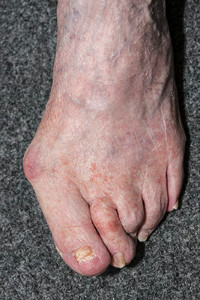 Patients who have bunions are generally aware of the pain and discomfort they may cause while wearing shoes. It is defined as a small bony growth that gradually forms on the side of the big toe, and can come from wearing shoes that do not have adequate room for the toes to move freely in. Additionally, genetic factors may play a significant role in the development of a bunion. There are noticeable symptoms that are often associated with bunions. These can include calluses that can develop on top of the bunion, and the big toe may point toward the other toes. Relief may be found when larger shoes are worn that can accommodate the protruding bone, in addition to wearing a pad over the affected area. In severe cases, surgery may be an option to consider for permanent removal. If you have developed a bunion, please consult with a podiatrist who can properly diagnose this condition and determine what the best treatment is for you.
Patients who have bunions are generally aware of the pain and discomfort they may cause while wearing shoes. It is defined as a small bony growth that gradually forms on the side of the big toe, and can come from wearing shoes that do not have adequate room for the toes to move freely in. Additionally, genetic factors may play a significant role in the development of a bunion. There are noticeable symptoms that are often associated with bunions. These can include calluses that can develop on top of the bunion, and the big toe may point toward the other toes. Relief may be found when larger shoes are worn that can accommodate the protruding bone, in addition to wearing a pad over the affected area. In severe cases, surgery may be an option to consider for permanent removal. If you have developed a bunion, please consult with a podiatrist who can properly diagnose this condition and determine what the best treatment is for you.
If you are suffering from bunions, contact one of our podiatrists of PA Foot & Ankle Associates. Our doctors can provide the care you need to keep you pain-free and on your feet.
What Is a Bunion?
A bunion is formed of swollen tissue or an enlargement of boney growth, usually located at the base joint of the toe that connects to the foot. The swelling occurs due to the bones in the big toe shifting inward, which impacts the other toes of the foot. This causes the area around the base of the big toe to become inflamed and painful.
Why Do Bunions Form?
Genetics – Susceptibility to bunions are often hereditary
Stress on the feet – Poorly fitted and uncomfortable footwear that places stress on feet, such as heels, can worsen existing bunions
How Are Bunions Diagnosed?
Doctors often perform two tests – blood tests and x-rays – when trying to diagnose bunions, especially in the early stages of development. Blood tests help determine if the foot pain is being caused by something else, such as arthritis, while x-rays provide a clear picture of your bone structure to your doctor.
How Are Bunions Treated?
- Refrain from wearing heels or similar shoes that cause discomfort
- Select wider shoes that can provide more comfort and reduce pain
- Anti-inflammatory and pain management drugs
- Orthotics or foot inserts
- Surgery
If you have any questions, please feel free to contact one of our offices located in Allentown, Easton, Northampton, and Chew Street in Allentown, PA . We offer the newest diagnostic and treatment technologies for all your foot care needs.
Diabetes and Neuropathy
 People who have diabetes often have diabetic neuropathy. This is a common condition among these types of patients, and it generally occurs from high blood sugar levels or an inflammation of the autoimmune system. Common symptoms of diabetic neuropathy can include a tingling sensation, the inability to feel any cuts or wounds on the feet, and it may be difficult to feel temperature change. In severe cases, patients may lose their balance, fall, and have additional foot injuries. There are specific tests that can be administered that may confirm this condition. These can consist of nerve studies for the arms and legs, and muscle tone can be evaluated by having an electromyography (EMG) performed. If you have diabetes, and are experiencing signs of neuropathy in your feet, it is strongly advised that you are under the care of a podiatrist.
People who have diabetes often have diabetic neuropathy. This is a common condition among these types of patients, and it generally occurs from high blood sugar levels or an inflammation of the autoimmune system. Common symptoms of diabetic neuropathy can include a tingling sensation, the inability to feel any cuts or wounds on the feet, and it may be difficult to feel temperature change. In severe cases, patients may lose their balance, fall, and have additional foot injuries. There are specific tests that can be administered that may confirm this condition. These can consist of nerve studies for the arms and legs, and muscle tone can be evaluated by having an electromyography (EMG) performed. If you have diabetes, and are experiencing signs of neuropathy in your feet, it is strongly advised that you are under the care of a podiatrist.
Neuropathy
Neuropathy can be a potentially serious condition, especially if it is left undiagnosed. If you have any concerns that you may be experiencing nerve loss in your feet, consult with one of our podiatrists from PA Foot & Ankle Associates. Our doctors will assess your condition and provide you with quality foot and ankle treatment for neuropathy.
What Is Neuropathy?
Neuropathy is a condition that leads to damage to the nerves in the body. Peripheral neuropathy, or neuropathy that affects your peripheral nervous system, usually occurs in the feet. Neuropathy can be triggered by a number of different causes. Such causes include diabetes, infections, cancers, disorders, and toxic substances.
Symptoms of Neuropathy Include:
- Numbness
- Sensation loss
- Prickling and tingling sensations
- Throbbing, freezing, burning pains
- Muscle weakness
Those with diabetes are at serious risk due to being unable to feel an ulcer on their feet. Diabetics usually also suffer from poor blood circulation. This can lead to the wound not healing, infections occurring, and the limb may have to be amputated.
Treatment
To treat neuropathy in the foot, podiatrists will first diagnose the cause of the neuropathy. Figuring out the underlying cause of the neuropathy will allow the podiatrist to prescribe the best treatment, whether it be caused by diabetes, toxic substance exposure, infection, etc. If the nerve has not died, then it’s possible that sensation may be able to return to the foot.
Pain medication may be issued for pain. Electrical nerve stimulation can be used to stimulate nerves. If the neuropathy is caused from pressure on the nerves, then surgery may be necessary.
If you have any questions, please feel free to contact one of our offices located in Allentown, Easton, Northampton, and Chew Street in Allentown, PA . We offer the newest diagnostic and treatment technologies for all your foot care needs.
More...
Plantar Warts Can Be Treated!
Do I Have a Heel Spur?
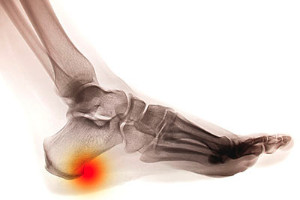 The medical condition that is known as a heel spur typically develops from inflammation that happens to the plantar fascia. It is defined as a bony growth that forms on the heel, and can cause pain and discomfort. Some of the reasons why this condition may develop can include sudden weight gain, wearing shoes that do not have adequate cushioning, or existing conditions that may include flat feet. The symptoms that patients experience can consist of pain in the heel and surrounding areas, and the foot may feel stiff upon arising in the morning. Research has indicated that mild relief may be found when orthotics are worn in the shoes, as this may be helpful in reducing pressure on the heel. If you have developed a heel spur, it is suggested that you consult with a podiatrist who can offer you correct treatment options.
The medical condition that is known as a heel spur typically develops from inflammation that happens to the plantar fascia. It is defined as a bony growth that forms on the heel, and can cause pain and discomfort. Some of the reasons why this condition may develop can include sudden weight gain, wearing shoes that do not have adequate cushioning, or existing conditions that may include flat feet. The symptoms that patients experience can consist of pain in the heel and surrounding areas, and the foot may feel stiff upon arising in the morning. Research has indicated that mild relief may be found when orthotics are worn in the shoes, as this may be helpful in reducing pressure on the heel. If you have developed a heel spur, it is suggested that you consult with a podiatrist who can offer you correct treatment options.
Heel spurs can be incredibly painful and sometimes may make you unable to participate in physical activities. To get medical care for your heel spurs, contact one of our podiatrists from PA Foot & Ankle Associates. Our doctors will do everything possible to treat your condition.
Heels Spurs
Heel spurs are formed by calcium deposits on the back of the foot where the heel is. This can also be caused by small fragments of bone breaking off one section of the foot, attaching onto the back of the foot. Heel spurs can also be bone growth on the back of the foot and may grow in the direction of the arch of the foot.
Older individuals usually suffer from heel spurs and pain sometimes intensifies with age. One of the main condition's spurs are related to is plantar fasciitis.
Pain
The pain associated with spurs is often because of weight placed on the feet. When someone is walking, their entire weight is concentrated on the feet. Bone spurs then have the tendency to affect other bones and tissues around the foot. As the pain continues, the feet will become tender and sensitive over time.
Treatments
There are many ways to treat heel spurs. If one is suffering from heel spurs in conjunction with pain, there are several methods for healing. Medication, surgery, and herbal care are some options.
If you have any questions feel free to contact one of our offices located in Allentown, Easton, Northampton, and Chew Street in Allentown, PA . We offer the latest in diagnostic and treatment technology to meet your needs.
The Function of the Sesamoid Bones
The sesamoid bones are located under the ball of the foot. They help to enable the big toe to press down, and pain and discomfort may develop if they should become inflamed. This may happen as a result of participating in running and jumping activities, or from wearing shoes that do not fit correctly. Common symptoms that can be associated with this ailment may include pain on the bottom of the foot, and it may be difficult to stand on your tiptoes. Patients who have this condition may find moderate relief when the affected foot is elevated, and it may help to use an insole that can support the arch. If you feel you may have sesamoiditis, it is strongly advised that you consult with a podiatrist who can properly diagnose and treat this condition.
Sesamoiditis is an unpleasant foot condition characterized by pain in the balls of the feet. If you think you’re struggling with sesamoiditis, contact one of our podiatrists of PA Foot & Ankle Associates. Our doctors will treat your condition thoroughly and effectively.
Sesamoiditis
Sesamoiditis is a condition of the foot that affects the ball of the foot. It is more common in younger people than it is in older people. It can also occur with people who have begun a new exercise program, since their bodies are adjusting to the new physical regimen. Pain may also be caused by the inflammation of tendons surrounding the bones. It is important to seek treatment in its early stages because if you ignore the pain, this condition can lead to more serious problems such as severe irritation and bone fractures.
Causes of Sesamoiditis
- Sudden increase in activity
- Increase in physically strenuous movement without a proper warm up or build up
- Foot structure: those who have smaller, bonier feet or those with a high arch may be more susceptible
Treatment for sesamoiditis is non-invasive and simple. Doctors may recommend a strict rest period where the patient forgoes most physical activity. This will help give the patient time to heal their feet through limited activity. For serious cases, it is best to speak with your doctor to determine a treatment option that will help your specific needs.
If you have any questions please feel free to contact one of our offices located in Allentown, Easton, Northampton, and Chew Street in Allentown, PA . We offer the newest diagnostic and treatment technologies for all your foot and ankle needs.
Common Signs of Athlete’s Foot
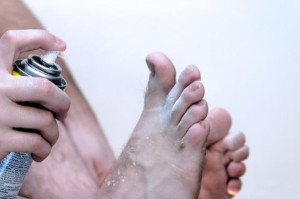 Common symptoms of an uncomfortable foot condition that is known as athlete’s foot can consist of a burning and itching sensation between the toes or on the bottom of the feet. In severe cases, blisters can develop and may become infected from intense scratching. This condition is caused by a fungus that is found in moist environments. These moist locations may include shower room floors, public pools, and surrounding areas. Additional symptoms may include foot odor, and the skin may become dry and cracked. The signs of athlete’s foot may lessen in a few weeks, but if it is recurring or will not heal, it is suggested that you speak to a podiatrist for proper treatment.
Common symptoms of an uncomfortable foot condition that is known as athlete’s foot can consist of a burning and itching sensation between the toes or on the bottom of the feet. In severe cases, blisters can develop and may become infected from intense scratching. This condition is caused by a fungus that is found in moist environments. These moist locations may include shower room floors, public pools, and surrounding areas. Additional symptoms may include foot odor, and the skin may become dry and cracked. The signs of athlete’s foot may lessen in a few weeks, but if it is recurring or will not heal, it is suggested that you speak to a podiatrist for proper treatment.
Athlete’s Foot
Athlete’s foot is often an uncomfortable condition to experience. Thankfully, podiatrists specialize in treating athlete’s foot and offer the best treatment options. If you have any questions about athlete’s foot, consult with one of our podiatrists from PA Foot & Ankle Associates. Our doctors will assess your condition and provide you with quality treatment.
What Is Athlete’s Foot?
Tinea pedis, more commonly known as athlete’s foot, is a non-serious and common fungal infection of the foot. Athlete’s foot is contagious and can be contracted by touching someone who has it or infected surfaces. The most common places contaminated by it are public showers, locker rooms, and swimming pools. Once contracted, it grows on feet that are left inside moist, dark, and warm shoes and socks.
Prevention
The most effective ways to prevent athlete’s foot include:
- Thoroughly washing and drying feet
- Avoid going barefoot in locker rooms and public showers
- Using shower shoes in public showers
- Wearing socks that allow the feet to breathe
- Changing socks and shoes frequently if you sweat a lot
Symptoms
Athlete’s foot initially occurs as a rash between the toes. However, if left undiagnosed, it can spread to the sides and bottom of the feet, toenails, and if touched by hand, the hands themselves. Symptoms include:
- Redness
- Burning
- Itching
- Scaly and peeling skin
Diagnosis and Treatment
Diagnosis is quick and easy. Skin samples will be taken and either viewed under a microscope or sent to a lab for testing. Sometimes, a podiatrist can diagnose it based on simply looking at it. Once confirmed, treatment options include oral and topical antifungal medications.
If you have any questions, please feel free to contact one of our offices located in Allentown, Easton, Northampton, and Chew Street in Allentown, PA . We offer the newest diagnostic and treatment technologies for all your foot care needs.

